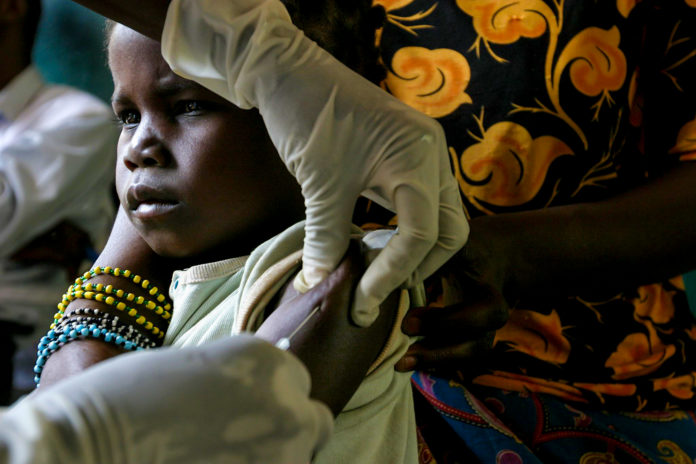The agencies and their partners are warning of an unprecedented situation in the Democratic Republic of Congo, where cholera and measles epidemics are worsening the health situation in a country already hard hit by the Ebola epidemic.
More than 800,000 people will be vaccinated against cholera in North Kivu, in the east of the Democratic Republic of Congo (DRC), with the launch of a major oral vaccination campaign.
The campaign will be implemented by the DRC Ministry of Health with support from WHO and its partners, and financed by Gavi, the Vaccine Alliance. During these vaccination activities, a total of 835,183 people living in the health zones of Binza, Goma, Kayina, Karisimbi, Kibirizi, Kirotshe and Rutshuru will be immunized until June 1, 2019.
The campaign will administer the first of two doses of oral cholera vaccine (OCV) to at-risk populations. Following successful implementation, a campaign to administer the second dose will take place at a later stage, providing full immune protection against cholera.
More than 10,000 cases of cholera have been reported in the country since January 2019, resulting in over 240 deaths. In addition, more than 80,000 suspected cases of measles have resulted in over 1,400 deaths since the beginning of the year, while a case of circulating type 2 poliovirus was reported in Kasai province earlier this month.
''The DRC is facing an unprecedented combination of deadly epidemics,'' said Dr. Seth Berkley, Executive Director of Gavi, the Vaccine Alliance. ''While the Ebola virus disease outbreak continues to cause untold misery in the East, measles and cholera epidemics are also claiming thousands of victims across the country. That's why we're stepping up our response, through this cholera vaccination campaign, ongoing measles vaccination in health zones affected by the measles epidemic, and our ongoing support for anti-Ebola vaccination in the DRC and neighboring countries. We cannot allow this needless suffering to continue.
Cholera is a preventable disease. Vaccinating at-risk people in the most exposed health zones of North Kivu to prevent them from contracting cholera is a major contribution and effort to protect hundreds of thousands of people from this disease and to increase the level of immunity of the population," said Dr. Deo Nshimirimana, WHO Representative ad interim in the Democratic Republic of Congo. He added: "WHO is working closely with the national and provincial authorities in North Kivu and all partners to ensure that all targeted people in these health zones will be vaccinated."
The 835,183 doses of oral cholera vaccine (OCV) were drawn from the global stockpile of cholera vaccines, fully funded by Gavi, which is also covering the operational costs of the campaign. The use of the stockpile for epidemic response is managed by the International Coordination Group (ICG), made up of representatives from WHO, UNICEF, IFRC and MSF.
Since the launch of the stockpile in 2013, millions of doses of OCV have been used to combat epidemics worldwide. In the last fifteen years (between 1997 and 2012), only 1.5 million doses of oral cholera vaccine have been used worldwide. In 2018 alone, the stockpile supplied 17 million doses to 22 different countries. Since the start of 2019, more than 6 million doses have already been shipped to deal with epidemics or to combat endemic cholera in countries such as Mozambique, Nigeria, Somalia and Zimbabwe.
In addition, over 2 million people were recently vaccinated in the DRC as part of a measles response campaign in 72 health zones, funded by Gavi through the Measles and Rubella Initiative (MRI). Over 400,000 people are expected to be vaccinated as part of this response. Gavi will also fund a measles campaign for 18 million children aged 6 months to 59 months, starting later this year. This campaign adds to Gavi's support for the government's efforts to strengthen routine immunization, which is the best long-term solution to measles epidemics.


